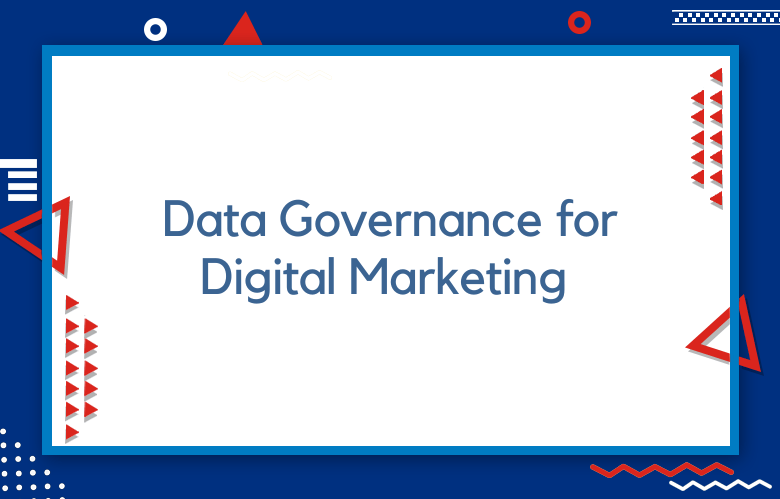Data Governance for Digital Marketing Building Strategy & Best Practices

Data governance in digital marketing is a critical framework that encompasses the processes, policies, standards, and metrics that ensure the effective and efficient use of information to enable an organization to achieve its goals. As digital marketing relies heavily on data for targeted campaigns, customer insights, and personalized experiences, having a robust data governance strategy ensures that data is accurate, consistent, reliable, and secure, aligning with both business objectives and compliance requirements.
Data Governance for Digital Marketing: Building Strategy & Best Practices
The rapidly evolving digital landscape, characterized by diverse data sources, real-time analytics, and stringent privacy regulations, necessitates a comprehensive approach to data governance. This approach not only addresses data quality and consistency but also emphasizes privacy, ethical data use, and adherence to global data protection laws like GDPR and CCPA.
Building an effective data governance strategy in digital marketing involves defining clear data ownership, establishing data quality standards, implementing data privacy and security measures, and fostering a data-driven culture within the organization. It also requires continuous monitoring, auditing, and updating data practices to adapt to new technologies, market trends, and regulatory changes.
Best practices in data governance for digital marketing include transparent data collection policies, consent management, data minimization, and the use of privacy-enhancing technologies. These practices safeguard customer data and, build trust, and enhance customer relationships, ultimately contributing to more effective and sustainable marketing outcomes.
- Key Takeaways
- Defining Marketing Data Governance
- Importance of Data Governance
- Benefits and Impacts on Strategy
- Steps to Build Your Strategy
- Critical Elements of Effective Governance
- Operationalizing Data Governance
- Addressing Common Challenges
- Best Practices for Implementation
- Final Remarks
- Frequently Asked Questions
- What is the significance of data governance in digital marketing?
- How can effective data governance benefit a digital marketing strategy?
- What are the critical elements required for successful marketing data governance?
- How can businesses operationalize data governance for digital marketing success?
- What are some common challenges faced when implementing data governance in digital marketing?
Exploring the digital marketing realm reveals a crucial element often overlooked: data governance. In today’s data-driven landscape, understanding and implementing effective data governance for digital marketing is paramount. By establishing precise data collection, storage, and usage guidelines, businesses can enhance decision-making processes and drive targeted marketing campaigns. This blog post delves into the significance of data governance in optimizing digital marketing strategies, ensuring compliance with regulations, and safeguarding consumer privacy. Stay tuned to uncover practical insights on leveraging data governance to elevate your digital marketing efforts.
Key Takeaways
Establish clear guidelines
Define and document your marketing data governance policies to ensure consistency and compliance.
Enhance decision-making
Data governance improves data quality and reliability, leading to more informed strategic decisions.
Align strategy with objectives.
Leverage data governance to align your digital marketing strategy with business goals and enhance overall performance.
Develop a structured approach.
Follow a systematic process to build and operationalize your data governance strategy effectively.
Focus on critical components.
Pay attention to crucial elements like data quality, security, and privacy to ensure the success of your governance framework.
Proactively address challenges
Anticipate and address common data governance challenges to maintain the integrity and effectiveness of your strategy.
Defining Marketing Data Governance
Key Components
Marketing data governance involves establishing policies, processes, and controls to ensure marketing data’s accuracy, consistency, and security. It includes defining data ownership, access levels, and quality standards.
Implementing a data catalog helps organize and categorize marketing data assets. Data dictionaries document the meaning and structure of data elements, facilitating consistent interpretation across teams.
Alignment with Organizational Goals
Effective marketing data governance is crucial for achieving organizational goals such as improving customer engagement, enhancing decision-making, and ensuring regulatory compliance. By maintaining clean and reliable data, businesses can make informed decisions that drive growth.
Data governance frameworks enable organizations to align their marketing strategies with broader business objectives. By ensuring that marketing data is accurate and up-to-date, companies can deliver personalized experiences that resonate with customers.
Role of Departments
The marketing department is crucial in defining data requirements and ensuring data-driven campaigns are executed effectively. They collaborate with the IT department to implement technical solutions for managing marketing data securely.
The compliance team ensures data governance practices adhere to regulations such as GDPR or CCPA. They monitor data usage to prevent unauthorized access or misuse, safeguarding customer privacy.
Importance of Data Governance
Impact on Business Strategies
Data governance plays a crucial role in shaping business strategies by providing accurate and reliable data for decision-making. Companies implementing robust data governance practices can optimize their marketing efforts based on real-time insights. This leads to improved targeting, personalized campaigns, and enhanced customer engagement.
Legal and Ethical Standards
Data governance is essential for ensuring businesses comply with legal regulations and ethical standards when handling customer data. Organizations can mitigate risks related to data breaches and privacy violations by establishing clear guidelines and protocols through data governance. This protects the company from legal repercussions and builds a positive reputation among customers.
Trust and Accountability
Implementing effective data governance promotes trust and accountability within the organization. Companies can enhance transparency and integrity in their operations by setting up processes to monitor data quality, security, and access controls. This fosters a culture of accountability where employees know their responsibilities in managing data ethically and securely.
Benefits and Impacts on Strategy
Decision Making
Data governance is crucial in supporting decision-making processes within digital marketing strategies. By ensuring the accuracy and reliability of data, organizations can make informed decisions based on real-time insights, leading to more effective campaigns and targeted marketing efforts.
Effective data governance helps establish clear guidelines for data usage, ensuring that only relevant and accurate information is utilized in decision-making processes. This minimizes the risk of errors and enhances the overall efficiency of marketing strategies.
Legal Compliance
One significant aspect of data governance is its role in protecting against legal issues. Regulations like GDPR and CCPA govern how businesses handle consumer data, so adherence to these laws is essential. Data governance ensures that all data processing activities comply with legal requirements, reducing the risk of fines or penalties due to non-compliance.
By implementing robust data governance practices, organizations can safeguard sensitive customer information, maintain transparency in data handling processes, and build consumer trust. This mitigates legal risks and enhances brand reputation in the long run.
Global Data Management
Managing global data sources effectively is a crucial challenge for digital marketers in today’s interconnected world. Data governance provides a framework for standardizing data formats, ensuring consistency across different regions, languages, and platforms. This enables organizations to centralize their data management processes and streamline operations on a global scale.
With proper data governance mechanisms in place, companies can overcome barriers related to language differences, regulatory variations, and cultural nuances when dealing with diverse datasets from around the world. This facilitates smoother collaboration between international teams and improves the overall quality of marketing initiatives.
Steps to Build Your Strategy
Mapping Data Origins
To build a robust data governance strategy for digital marketing, start by mapping the origins of your data. Identify all sources where data is collected, including CRM systems, social media platforms, and website analytics tools. This process helps standardize data formats and structures across different channels.
Understanding where your data comes from enables you to ensure consistency and accuracy in your marketing campaigns. By mapping data origins, you can create a centralized repository that stores all relevant information for easy access and management. This step lays the foundation for effective data governance.
Defining Data Collection Points
Defining data collection points is another crucial aspect of developing a solid data governance strategy. These are the touchpoints where customer information is gathered, such as lead forms, purchase transactions, or online interactions. Clearly outlining these collection points helps organize and categorize data effectively.
By defining data collection points, marketers can enhance personalization efforts by capturing relevant details about their target audience. This step also aids in improving segmentation strategies by ensuring that the right data is collected at the right stages of the customer journey, optimizing the quality of insights derived from marketing activities.
Compliance with Changing Data Laws
In today’s digital landscape, staying compliant with evolving data laws is paramount for any marketing strategy. As regulations like GDPR and CCPA continue to shape how businesses handle consumer information, ensuring compliance is non-negotiable. Adhering to these laws protects customer privacy and safeguards your brand reputation.
Failing to comply with data regulations can result in hefty fines and damage to brand credibility. Therefore, marketers must stay updated on legislative changes and adjust their data governance practices accordingly. Building a strategy that aligns with current laws demonstrates ethical conduct and builds customer trust.
Critical Elements of Effective Governance
Decision-making Support
Clear decision-making support is crucial in data governance for digital marketing. It ensures that decisions are based on accurate and reliable data, leading to more effective strategies. Organizations can make informed choices that drive successful marketing campaigns by providing the necessary information and insights.
Effective governance establishes frameworks for decision-making processes within a digital marketing strategy. It outlines the responsibilities of key stakeholders and sets clear guidelines for making decisions based on data analysis. This clarity helps avoid confusion and ensures that actions align with the overall objectives of the marketing initiatives.
Role Definition and Expectations
Data governance plays a significant role in defining roles and expectations across different teams involved in digital marketing efforts. It clarifies who is responsible for data collection, analysis, interpretation, and implementation. By clearly defining roles, organizations can streamline processes, reduce duplication of efforts, and ensure accountability at every stage of the marketing journey.
Having well-defined roles also fosters collaboration among team members by establishing a shared understanding of each individual’s responsibilities. This collaborative environment promotes efficiency and effectiveness in utilizing data for marketing purposes.
Efficient Data Source Guidance
Effective governance guides data sources efficiently, ensuring that the correct information is collected from reliable sources. By setting standards for data quality, organizations can trust the accuracy and relevance of the information used in their marketing strategies. This reliability enhances decision-making processes and leads to more impactful campaigns.
Governance frameworks help identify trustworthy data sources while filtering out irrelevant or unreliable information. This process streamlines the data collection, saving time and resources that would otherwise be spent sifting through vast data. As a result, marketers can focus on leveraging high-quality data to drive successful outcomes.
Operationalizing Data Governance
Implementation Process
Implementing data governance strategies involves setting up frameworks, policies, and procedures to ensure data quality and compliance. Clear guidelines are crucial for successful implementation.
Collaboration between IT and marketing teams is essential in operationalizing data governance. Regular meetings to align goals and strategies enhance the process’s effectiveness.
Standardized reviews play a significant role in testing the data governance strategy. Consistent evaluations help identify gaps and areas for improvement in the system.
Importance of Collaboration
Collaboration between IT and marketing teams ensures that data governance strategies align with business objectives. Shared responsibilities lead to better decision-making processes.
Both teams can leverage their expertise to create a robust data governance framework by working together. Cross-functional knowledge enhances the strategy’s overall effectiveness.
Standardized Reviews
Standardized reviews involve regular data quality audits, security measures, and compliance protocols. Systematic checks help maintain the integrity of the data governance strategy.
Standardized review processes ensure that any issues or discrepancies are identified promptly. Timely interventions prevent potential risks or errors from escalating.
Addressing Common Challenges
Resistance Strategies
Implementing data governance in digital marketing often faces challenges, including resistance from stakeholders. Organizations can conduct training sessions to overcome this and increase awareness and understanding.
Resistance is common when changes disrupt established workflows. Organizations can mitigate resistance effectively by involving key stakeholders early on and communicating the benefits clearly.
Continuous Monitoring and Adaptation
Data governance requires continuous monitoring to ensure compliance and effectiveness. Regular audits and reviews help identify gaps that need to be addressed promptly.
Organizations should establish clear metrics to measure the success of their data governance efforts. This allows for adjustments to be made in real time to improve processes and outcomes.
Best Practices for Implementation
Ongoing Training
Implementing data governance successfully requires a commitment to ongoing training and education. Training sessions help employees stay updated on the latest data governance protocols and best practices.
Continuous education ensures that all team members understand the importance of data governance in digital marketing. By investing in training programs, organizations can empower their employees to make informed decisions regarding data handling.
Cultivating a Data Governance Culture
Creating a culture of data governance within the organization is crucial for long-term success. This involves instilling a mindset where everyone values and prioritizes data integrity and security.
Encouraging open communication channels and promoting accountability are critical to fostering a solid data governance culture when employees feel empowered to raise concerns or suggest improvements, the organization benefits from enhanced data quality and compliance.
Final Remarks
You now grasp the significance of data governance for digital marketing. Implementing a robust strategy can enhance decision-making, ensure compliance, and boost overall performance. Remember, effective governance is not a one-time task but an ongoing process that requires dedication and adaptability.
As you embark on your data governance journey, stay proactive in addressing challenges and embracing best practices. Your commitment to high standards will set you apart in the competitive digital landscape. Take charge of your marketing data with a solid governance framework, and watch your strategies thrive.
Frequently Asked Questions
What is the significance of data governance in digital marketing?
Data governance ensures accurate, consistent, and compliant data usage in digital marketing. It enhances decision-making processes, boosts customer trust, and maximizes the effectiveness of marketing strategies.
How can effective data governance benefit a digital marketing strategy?
Effective data governance improves data quality, enhances targeting precision, increases campaign ROI, and ensures regulatory compliance. It fosters trust with customers by delivering personalized and relevant content.
What are the critical elements required for successful marketing data governance?
Key elements include clear policies and procedures, data quality management tools, stakeholder involvement, regular audits, compliance monitoring, and continuous training programs. These components ensure data accuracy, security, and ethical use in marketing activities.
How can businesses operationalize data governance for digital marketing success?
Businesses can operationalize data governance by appointing dedicated roles or teams responsible for oversight, creating standardized processes for data handling, implementing technology solutions for automation and monitoring compliance, and fostering a culture of data responsibility across departments.
What are some common challenges faced when implementing data governance in digital marketing?
Common challenges include employees’ resistance to change, a lack of top-level support, inadequate resources or budget allocation, siloed data environments within the organization, and ensuring alignment between IT and marketing teams. Overcoming these hurdles is crucial for successful implementation.



